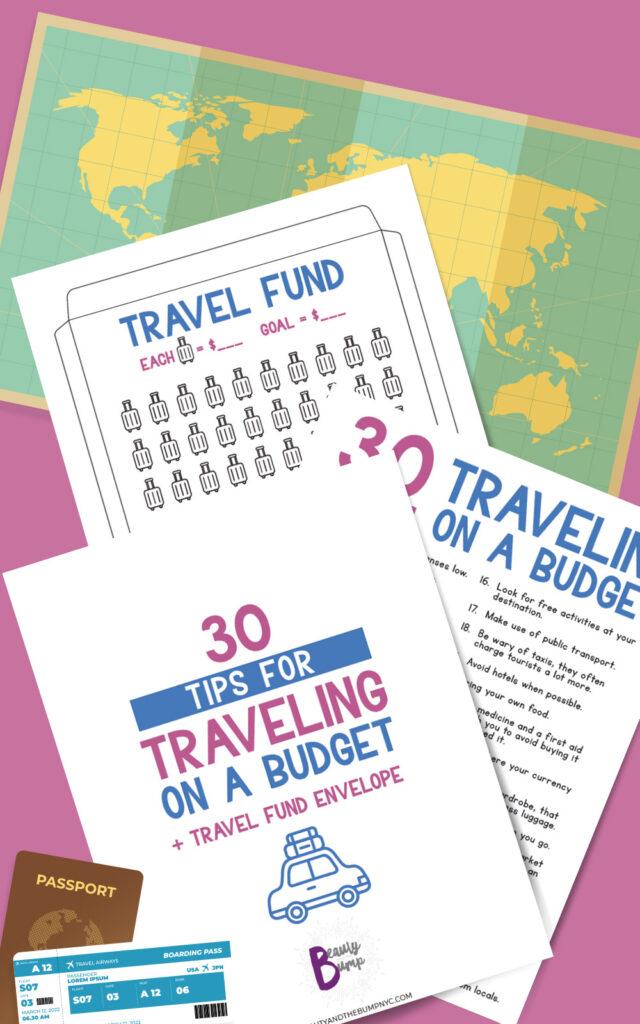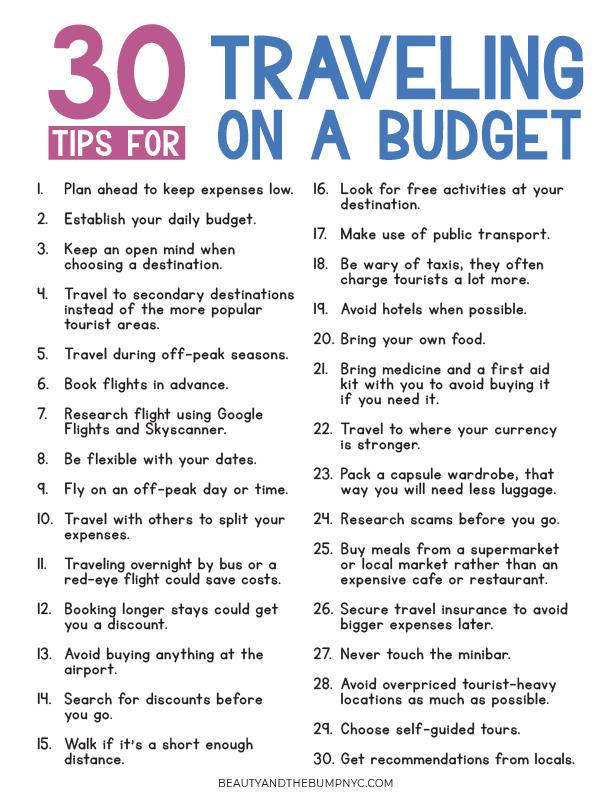Planning a family vacation can be exciting, but also overwhelming, especially when trying to stick to a budget. As a married mom of two young children, I know all too well the challenges of planning a budget-friendly trip. My family loves to explore new places, but we always keep an eye out for deals and opportunities to save money. That’s why I’ve compiled a list of 30 tips for traveling on a budget, to help you plan your next vacation without sacrificing fun and adventure. And to make things even easier, we’ve created a printable packet of these tips along with a Travel Fund envelope, so you can stay organized and on track with your budget goals.

Related: Road Trip Planner: Printable Safety, Preparedness, and Budget Worksheets
Tip #1 – Plan ahead to keep expenses low
By planning your trip in advance, you can take advantage of early-bird discounts and avoid last-minute costs.
Tip #2 – Establish your daily budget.
Knowing how much you have to spend each day will help you avoid overspending and keep you on track.
Tip #3 – Keep an open mind when choosing a destination.
Sometimes the most unexpected destinations can offer the best experiences and deals.
Tip #4 – Travel to secondary destinations instead of the more popular tourist areas.
These destinations are often just as beautiful and interesting but can be more affordable.
Tip #5 – Travel during off-peak seasons.
By traveling during the off-season, you can avoid crowds and enjoy lower prices on flights and accommodations.
Tip #6 – Book flights in advance.
Booking early can save you money, as prices tend to rise closer to the departure date.
Tip #7 – Research flights using Google Flights and Skyscanner.
These sites allow you to compare prices across multiple airlines and find the best deals.
Tip #8 – Be flexible with your dates.
By being flexible with your travel dates, you can take advantage of cheaper flights and accommodations.
Tip #9 – Fly on an off-peak day or time.
Avoid flying during peak times, such as weekends or holidays, as prices tend to be higher.
Tip #10 – Travel with others to split your expenses.
Traveling with friends or family members can help you split the costs of accommodations and transportation.
Tip #11 – Traveling overnight by bus or a red-eye flight could save costs.
If you don’t mind traveling during odd hours, you can save money on transportation and accommodations.
Tip #12 – Booking longer stays could get you a discount.
Many hotels and vacation rentals offer discounts for longer stays, so consider extending your vacation.
Tip #13 – Avoid buying anything at the airport.
Prices at the airport are often inflated, so it’s better to bring your own snacks and water.
Tip #14 – Search for discounts before you go.
Look for coupons, deals, and discounts online before you go to save money on attractions, restaurants, and activities.
Tip #15 – Walk if it’s a short enough distance.
Walking is not only free, but it’s also a great way to explore a new destination.
Tip #16 – Look for free activities at your destination.
Many cities offer free museums, parks, and festivals, so do your research before you go.
Tip #17 – Make use of public transport.
Public transportation is often cheaper than taxis or rental cars, so consider using it to get around.
Tip #18 – Be wary of taxis, they often charge tourists a lot more.
If you must take a taxi, negotiate the fare in advance to avoid being overcharged.
Tip #19 – Avoid hotels when possible.
Vacation rentals, hostels, and homestays are often cheaper and offer more local experiences.
Tip #20 – Bring your own food.
Packing your own snacks and meals can save you money on restaurants and cafes.
Tip #21 – Bring medicine and a first aid kit with you to avoid buying it if you need it.
This can save you money and time if you get sick or injured during your trip.
Tip #22 – Travel to where your currency is stronger.
By traveling to destinations where your currency is stronger, you can stretch your budget further.
Tip #23 – Pack a capsule wardrobe, that way you will need less luggage.
By packing versatile clothing that can be mixed and matched, you can avoid paying for checked luggage.
Tip #24 – Research scams before you go.
Knowing what scams to look out for in advance can save you a lot of money and trouble. For example, some common scams include pickpocketing, overcharging, fake tours, and even ATM skimming. By researching these scams before you go, you’ll be better equipped to avoid them and protect yourself and your belongings.
Tip #25 – Buy meals from a supermarket or local market rather than an expensive cafe or restaurant.
Dining out can be a significant expense when traveling. To save money, consider buying food from a supermarket or local market and preparing your own meals. This is especially useful if you have access to a kitchen where you’re staying. Not only can you save money, but you can also experience the local cuisine and ingredients.
Tip #26 – Secure travel insurance to avoid bigger expenses later.
No one wants to think about things going wrong on a trip, but accidents and unexpected events can happen. Travel insurance can help protect you from costly medical expenses, trip cancellations, lost luggage, and other unforeseen circumstances. It may seem like an unnecessary expense, but it can save you a lot of money and hassle in the long run.
Tip #27 – Never touch the minibar.
Minibars in hotels can be tempting, but they often come with inflated prices. We often have to remind our kids to not touch the candy and chips. To avoid the temptation, we bring their favorite snacks. If you want to enjoy a drink or snack in your room, it’s usually much cheaper to buy them from a local store and bring them back to your hotel.
Tip #28 Avoid overpriced tourist-heavy locations as much as possible.
Tourist hotspots are often overpriced and can quickly eat into your travel budget. Instead, try to explore less popular areas and find hidden gems that are more affordable and authentic. This can also help you avoid crowds and have a more unique and personalized experience.
Tip #29 – Choose self-guided tours.
While guided tours can be informative and fun, they often come with a hefty price tag. Instead, consider exploring on your own and using online resources and travel guides to plan your itinerary. This can also give you more flexibility and the ability to go at your own pace.
Tip #30 – Get recommendations from locals.
Locals can be a great source of information when it comes to finding budget-friendly activities, restaurants, and accommodations. Don’t be afraid to ask for recommendations or strike up a conversation with locals to get insider tips and advice.
Related: Cash Envelope Budgeting Printable Packet Makes Saving Easy
How to Use the Printable Travel Fund Envelope
The printable travel fund envelope included in the packet is a fun and easy way to save money for your next trip. It’s designed to look like a little suitcase, with spaces to write down how much money you want to save and the deadline for reaching your goal. You can use it to track your progress and stay motivated as you work towards your travel fund. A travel fund is simply a savings account or designated amount of money set aside specifically for travel expenses. By setting aside a little bit of money each month, you can gradually build up your travel fund and be ready to go on your next adventure without worrying about breaking the bank. Using the travel fund envelope can be a great way to visualize your progress toward your goal and stay motivated to save. Simply print out the envelope, fill it out with your savings goal, and start saving toward your dream vacation!

By following these tips, you can travel on a budget without sacrificing your enjoyment or comfort. Remember to plan ahead, stay flexible, and be open to new experiences and destinations. With a little bit of research and creativity, you can have a memorable and affordable vacation that you and your family will cherish for years to come.
We hope that these 30 tips for traveling on a budget have given you some useful insights and ideas for your next vacation. By planning ahead, staying flexible, and being open to new experiences, you can make the most of your travels without overspending. Don’t forget to download our printable packet and Travel Fund envelope to help you stay organized and on track with your budget goals. Happy travels!




